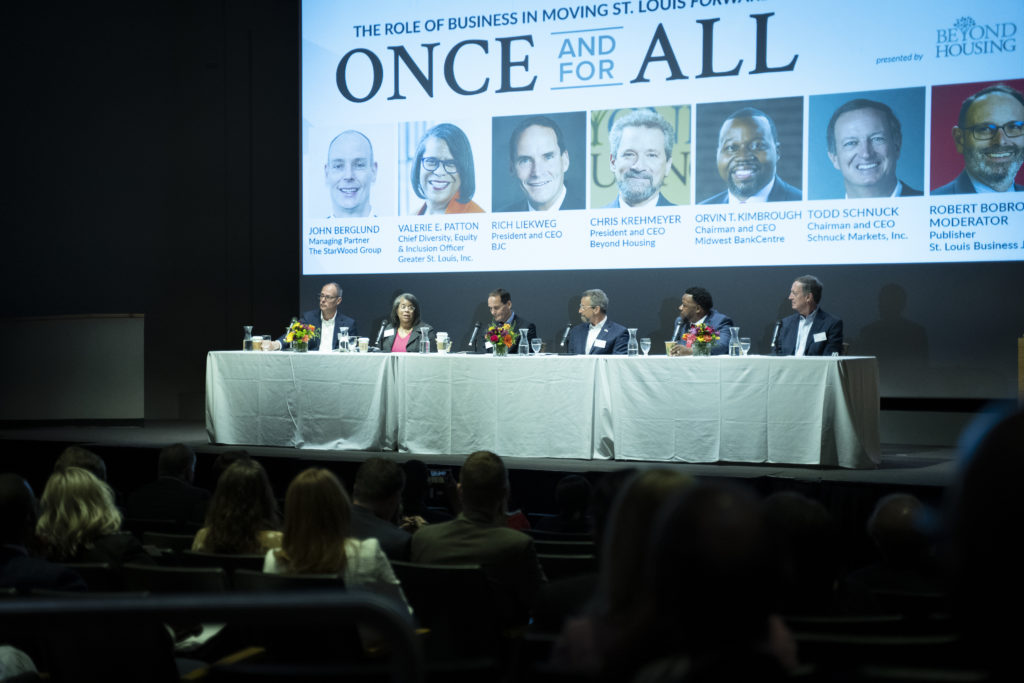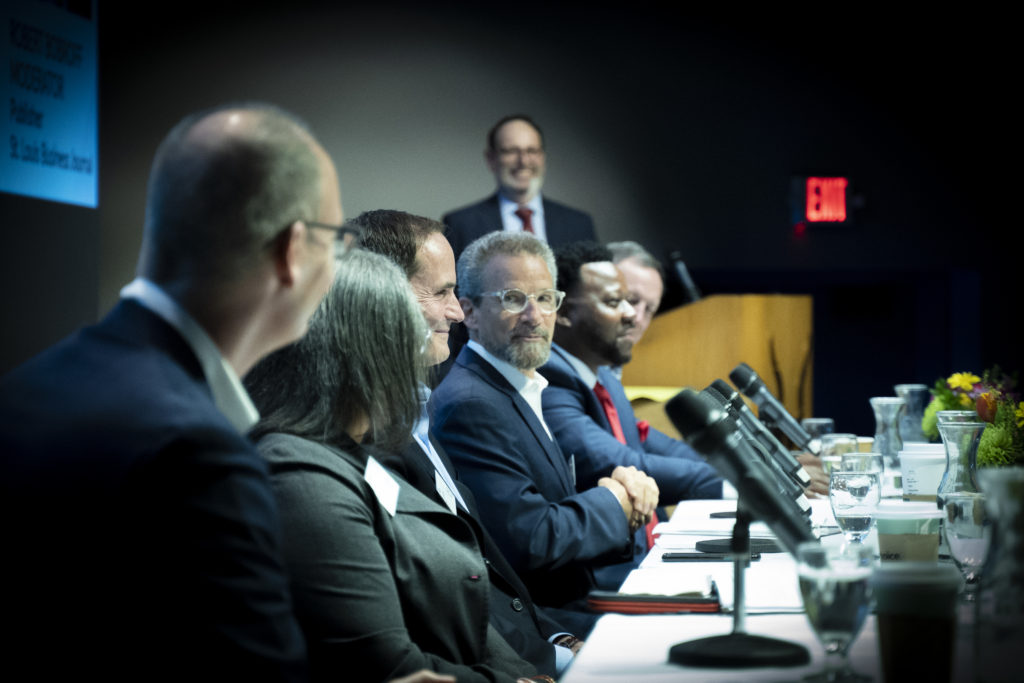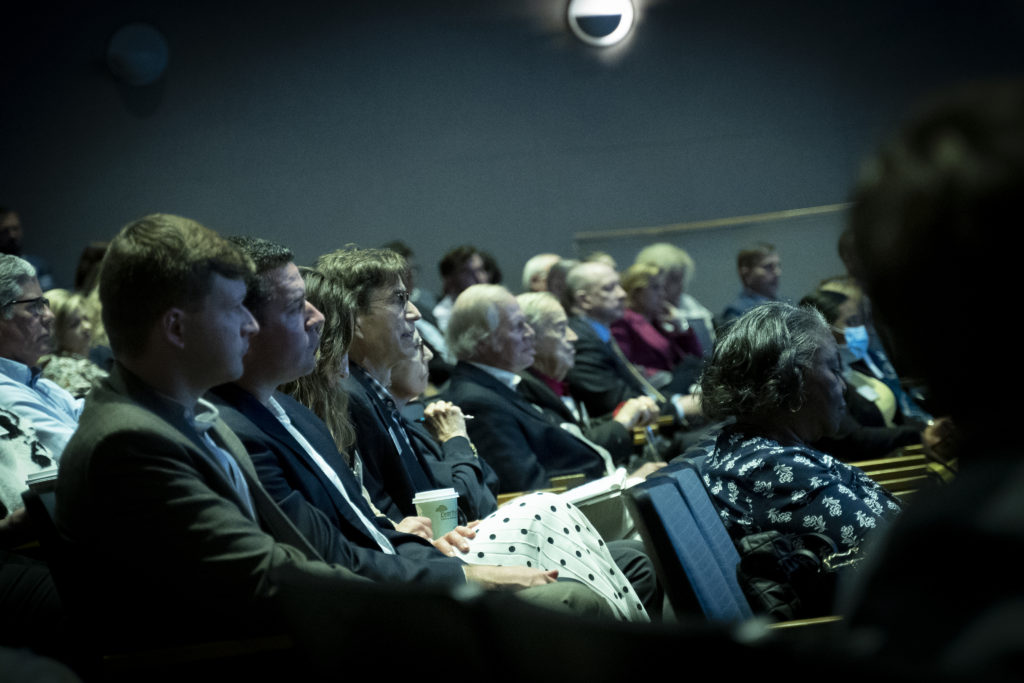

On Tuesday April 26 at the Living World in the St. Louis Zoo, Beyond Housing sponsored an event with the St. Louis Business Journal called Once and for All: The Role of Business in Moving St. Louis Forward.
The event featured a panel of St. Louis business leaders discussing how businesses can partner with other organizations to help address our region’s longstanding challenges and move St. Louis forward.
The panel included Rich Liekweg from BJC HealthCare, Orvin Kimbrough from Midwest BankCentre, Todd Schnuck from Schnuck Markets, Inc., Valerie Patton of Greater St. Louis, Inc., John Berglund of the StarWood Group, and Chris Krehmeyer of Beyond Housing. Robert Modroff of the St. Louis Business Journal moderated the discussion.
While some may regard events like this as more of the same discussion that produces little meaningful action, many attendees remarked how this felt different—that we have finally arrived to a point where leaders in business, nonprofits, and civic organizations all recognize what is driving our region’s challenges and are committed to taking real action.
Why do our core challenges remain?
The discussion began with an acknowledgment of the significant progress and investments made in the region over the last several years, from the Cortex Innovation Community to new commercial developments throughout the St. Louis area, impressive upgrades in our cultural institutions, and even a new soccer team and stadium.
Robert Bobroff asked the group why, despite all of this progress, do our core challenges from troubling crime rates to slow economic growth remain as formidable as ever?
The need to invest in communities and people left behind
This first question inspired more than 30 minutes of energetic discussion on a range of issues from failing schools to the severe inequities that still exist by zip code and color within our region. The panelists recognized a common underpinning of all these issues is our region’s high-concentrations of poverty and communities in decline—and our lack of commitment to fully address this.
This recognition is everything. If we want to truly address our region’s challenges, we have to understand the conditions that are creating them. As one example, Valerie Patton pointed how we often talk about crime in St. Louis but fail to recognize what is actually driving it. “Crime is an action of survival,” said Patton. She stressed that until we invest in these communities and create opportunity where little exists, we will always have an issue with crime.

Orvin Kimbrough spoke about the need for St. Louisans to “think as regional citizens” to reach our potential as a region. “We have yet to unleash the productive labor, the entrepreneurial spirit, and economic revitalization of black and brown communities. If we focus on those issues and aspects of our region that have been left behind, we’re going to be a world-class region again.”
In addition to investing in under-resourced communities, Rich Liekweg said “It’s important to make sure as anchor organizations we are creating and filling jobs for people not just of certain zip codes but also the most under-served zip codes.”
The panelists all stressed the need for businesses to create policies that break down existing disparities and to also partner with organizations working in under-resourced communities to make a difference.
The need to think differently
Chris Krehmeyer of Beyond Housing stressed that how we have addressed poverty within our many under-resourced communities in the past has not provided the change our region needs, and that it’s time for a new approach.
The most common failure is our tendency to address complex issues such as poverty through simplistic solutions that are not based on an understanding of how poverty creates deficits in multiple areas from housing to education, health, employment, and more. Berglund and Patton spoke of the need to create jobs but also address deficits in health and other areas that often prevent people from getting to those jobs and being productive. As a real-world example, Todd Schnuck mentioned how Schnucks stores have hundreds of job openings, but our current transit system makes it difficult for people who need these jobs to get there.
“Change is hard for St. Louis, but we have to innovate,” said Krehmeyer. “I truly believe our biggest challenges are our greatest opportunities. Let’s do it different. Let’s be the model everyone is writing about.”
Using the IPO model as a catalyst for change
To answer our region’s need to be more innovative in how we address our challenges, Beyond Housing is introducing a bold new addition to its Once and for All effort—an initial public offering (IPO) for investing in the future of St. Louis.
The IPO combines a results-oriented, investment mindset with the latest thinking on how to address complex social challenges.
Utilizing an innovative model for creating real and lasting change, the IPO enables St. Louis individuals and organizations to invest in our region’s future by addressing the root source of our challenges—our high concentrations of poverty and communities in decline—to finally move all of St. Louis forward.
Learn more at onceandforall.org/IPOforSTL.
